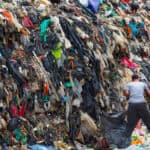Repairing Electronics: A Circular Economy Solution for Reducing E-Waste and Building Resilience in Rural Africa
From massive landfills stacked with large electronics like TVs, washing machines and refrigerators, to the increase of small electronics such as smartphones, tablets and headphones, the accumulation of electronic waste is an increasingly pressing issue around the world. Due to higher consumption rates of electronic equipment, and the short life-cycles and limited repair options for these devices, electronics are now the world’s fastest-growing solid waste stream. An estimated 53.6 million metric tonnes (Mt) of electronics was generated in 2019 alone, an amount that is predicted to more than double to 111 Mt/ year by 2050.
In many ways, Africa is ground zero for this problem. Even though the continent only produced 2.9 Mt (2.5 kg per capita) of e-waste in 2019 — far less than Asia (24.9 Mt), the Americas (13.1 Mt) and Europe (12 Mt) — a significant amount of electronic waste created in the Global North is being shipped to countries in Africa. With many global e-waste streams ending up in dumpsites across several African countries, it is estimated that over 60% of the e-waste in Africa comes from imports — and the actual numbers may be far higher, since much of this waste is imported illegally.
On a global scale, only 17.4% of electronics are properly collected, treated and recycled as part of the end-of-life process (as of 2019). In Africa, this number drops to 0.9%, and there is little data on what happens to the rest. Due to a lack of knowledge, legislation and financial resources, the predominant discarding methods across Africa are burning, dumping and landfilling.
A Circular Economy Solution to Reduce the Consequences of E-Waste
These informal ways of discarding electronics are resulting in serious consequences. High amounts of heavy metals and other toxic substances are being released indiscriminately into nature, degrading the environment, contaminating groundwater and harming human health. Valuable materials such as precious metals are also being lost. And though it may not be as immediately apparent, e-waste is contributing directly to the climate crisis, as greenhouse gases from discarded items like refrigerators and air conditioners leak into the atmosphere. Much like the problem of e-waste itself, the consequences of climate change have a disproportionate impact on Africa, which is dealing with an increase in extreme weather events, drought and flooding. These climate-related events are destroying vital crops, damaging important infrastructure and reducing hydroelectric power production, which increases famine, economic hardship and power outages across the region. And already vulnerable communities are being hit the hardest.
Since these climate impacts are only predicted to increase, urgent action is needed: not only to reduce the amount of e-waste produced globally and imported to Africa, but also to build resilience in the African communities that are dealing with the burden of this waste. One such solution could turn the problem of e-waste into an opportunity for building climate resilience, by financially strengthening these communities with circular economy approaches that view e-waste as a resource. These approaches aim to generate economic opportunities for local communities by developing their ability to recycle and repair electronic waste, which can potentially give rise to new income streams and boost the local economy in rural areas. As the United Nations Environment Programme put it, these solutions could “turn e-waste into gold” by helping to integrate the informal electronic waste recycling sector across Africa into a sustainable e-waste management strategy for the continent.
Reducing the E-Waste Impact of Solar Lighting
SolarAid is working to advance that goal, by testing and trialling innovative circular economy approaches in Zambia and Malawi that can help us avoid adding to the growing problem of e-waste, while also creating solutions that can be replicated by other actors.
Having distributed 2.3 million small, handheld solar lights across mostly rural areas in Africa, we recognise the issues that can arise from distributing electronics in rural areas. Even though increased use of solar lighting in rural households means less use of toxic alternatives such as paraffin candles and kerosene lights — as well as fewer batteries thrown on the ground after powering poor-quality lights — like all electronics, at some point a solar light will also fail and become e-waste.
But the lifespan of these devices can be extended if repair services are available. With the aim of creating an enabling environment for repair, in 2020 SolarAid in Zambia created a solar light take-back program in rural areas. We collected old lights from customers in these areas in exchange for vouchers: This helped them purchase new solar devices, if they wished to do so, and enabled us to dispose of the old devices properly. In research we conducted after the program launched, we found that 43% of the people we spoke to had tried to repair their solar lights once they had stopped working, but that 60% of those repairs did not work — and of those that did, few lasted longer than six months. These findings highlighted the extent of the demand for this sort of repair service. So we began engaging local technicians who were already providing repair services for electrical products, recruiting them into a program that would train them to repair our solar devices. We also launched a mobile app which helps facilitate the diagnosis and repair of solar lights by technicians in rural communities. These efforts to source spare parts and spread knowledge on how to repair solar lights have been an important step in the right direction, giving a second life to lights that have failed, and enabling more people to benefit from clean light for a longer time.
But training technicians to diagnose and repair solar lights has added benefits that go beyond extending the life of a solar light. Upskilling increases local knowledge of marketable skills, which can result in new entrepreneurship opportunities in areas that are hard to reach and often underserved by the businesses that generate employment elsewhere. By involving rural communities and using the resources and capacity that are already available there, this approach boosts the local economy and strengthens resilience in these communities, while also limiting the amount of electronic waste being created.
The Multiple Impacts of Repairing Electronic Products
In conversation with the technicians we’ve trained, we’ve learned about the positive impacts of this work. For instance, Rodgers Mwaba works as a repair technician in Kapiri Mposhi in Central Zambia. He was recently trained in repairing solar lights through SunnyMoney, SolarAid’s social enterprise in Zambia. He has not only benefited professionally from this new knowledge, he has also developed a new awareness of the importance of e-waste reduction, which he is sharing with others in his drought-stricken community.
He has become passionate about teaching others how to discard waste properly: “Improper disposal of certain electronic waste harmful to the environment can contribute to climate change,” he said. … “It is not only batteries that are harmful to the environment, some other electronic components also have adverse effects when not disposed of well.”
Mwaba’s customer, Peggy Hamalambo — a teacher by profession — agreed: “I know that electronic waste is harmful for the environment. Climate change is real and I believe most of it has been caused by human activity. For instance, the improper burning of electronic waste may produce dangerous fumes to both the people and the environment.”
When we spoke with her, Hamalambo had just gotten her light repaired by Mwaba. Now, instead of having to discard it, she can keep the light shining in her house at night. “The light just stopped working and I felt bad, so I kept it safe until now,” she said. … “I didn’t know that one day it will be repaired, I just kept the light because I liked it. And now that it is being repaired, it makes me feel happy to see it back to life.”
In an attempt to reach even further into rural communities, in 2022, SolarAid in Zambia extended our light repair training: Along with training individuals who were already working as local repair technicians, we’re now also training our own solar entrepreneurs, who sell our lights in communities across the country. On a daily basis, these entrepreneurs work directly with customers to get our solar lights out to rural areas. By training them on diagnosis and simple repair, we’re able to both support local community-based business, and generate repair knowledge that will be available in rural areas over the long term. This means our customers won’t have to go without safe lighting for long, even if their products malfunction or wear out.
Simon Muchinga has been a solar entrepreneur for SolarAid since 2008. He is one of the SolarAid agents working furthest from major population centres in Zambia, and he is playing an instrumental part in getting our lights out to some of the country’s most remote places. Some of his lights even reach across the border into the Democratic Republic of Congo.
Muchinga recently took part in the first of a series of two-day capacity building sessions, which gathered entrepreneurs from across rural Zambia with the aim of training them to diagnose and repair broken solar lights, as well as teaching them about the growing issue of e-waste. As one of 15 people selected as our top-performing entrepreneurs, he expressed excitement: “This was an amazing training. It’s good to know that I can diagnose a light, and it’s actually not very complicated. I think it will attract more customers and strengthen the trust people already have for me and my business.”
Our experience with this program has made it clear that, through working with local communities and supporting local capacity training, the opportunities in e-waste go beyond extracting its raw materials. Initiatives like our repair training program can not only reduce electronic waste, lengthen product life and extend access to solar lights and other beneficial products, they can create job opportunities, keep money in the local economy, and help build stronger, more financially resilient communities.
Note: This article was in NextBillion’s Most Influential Articles of 2023 contest.
Sofia Ollvid is the Communications Director at SolarAid.
Photo courtesy of SolarAid.
- Categories
- Energy, Environment, Technology



